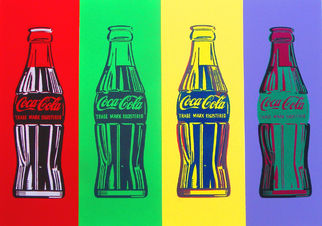Exclusivity and the mass market.
- Kara Holm
- Apr 3, 2016
- 3 min read
Andy Warhol said:

What’s great about this country is that America started the tradition where the richest consumers buy essentially the same things as the poorest. You can be watching TV and see Coca Cola, and you know that the President drinks Coca Cola, Liz Taylor drinks Coca Cola, and just think, you can drink Coca Cola, too. A coke is a coke and no amount of money can get you a better coke than the one the bum on the corner is drinking. All the cokes are the same and all the cokes are good. Liz Taylor knows it, the President knows it, the bum knows it, and you know it.
What Andy doesn’t mention is that because Coke is a mass market product, anyone, from the "bum on the corner" to the beautiful people, can afford a Coke.

Elizabeth Taylor had many things that were admired and coveted by the public but were simply not accessible to the mainstream audience. Some were clearly one-of-a-kind, like her over-33 carat diamond ring from Richard Burton. Others, like her couture collection, were understood to belong to the world of the superstar. And her lifestyle was something people watched with interest without imaging that it was available to them.
Liz was more like an aristocrat than one of us. I am quite sure my grandmother did not know when Liz Taylor was carrying a Lavin bag and wearing Dior. She only recognized that Liz looked amazing and was inspired to strive to look amazing too, doing the best with what was available to her. Her hair was aways immaculate and she always wore lipstick.
The image of Audrey Hepburn as Holly Golightly in the film version of Breakfast at Tiffany’s at dawn, staring in the window of Tiffany’s wearing last night’s Givenchy gown while drinking coffee from a paper cup has always felt prophetic to me. Holly wanted into the world beyond the glass.
Andy Warhol was a genius. Aspiration is a defining feature of American culture. (I’m not going to say it is a defining feature of North American culture, because in my experience many Canadians are conflicted about the trappings of wealth and success. I was told last week that there are no luxury car dealerships on Prince Edward Island.) Somewhere between Andy and his fetishization of celebrity and the advent of reality stars who are just like us only famous, many consumers (myself included) have decided that we want to own and experience our own little piece of what we imagine life of the 1% is like. As the gap between the “middle” class and the truly wealthy grows more of us want luxury.
So, of course, many luxury brands have stepped up. Nature abhors a vacuum. If the middle class wants to own Louis Vuitton bags and Louboutin shoes, the demand will be met. As a result, many luxury brands expanded their business. In doing so, their ability to deliver on the luxury aspects of their brands – service, quality and exclusivity – have been fundamentally eroded. In my opinion, you can't be a luxury hotel and have 7,000 guest rooms like the Venetian/Palazzo. And you can’t be a luxury purse or shoe manufacturer if your products are sold in every mall around the world.
While I understand the temptation to compromise on exclusivity to grow your market, providers of luxury goods and services that want to maintain their brand equity cannot compromise on quality and service.
The middle class masses (like me) want these luxury brands. We aspire to them! But accessibility to a mass market means that these brands have to give something up to deliver their brands at a price point that is accessible. How do you balance true luxury with aspiration and protect your brand value? Mercedes tries by offering a variety of products at different price points - marketed as offering the perfect vehicle for every phase of life.
You can buy a Louis Vuitton bag new off the rack or second hand. There are even street vendors in Istanbul (and I mean open air, not covered) where the principles of “cash and carry” bring a whole meaning to prêt-à-porter. Here, luxury is available, at a vastly reduced price, if one is willing to compromise quality to retain visible brand identity. But if you’re really in the know, there are more exclusive options. These true luxury items not available to us, but to those “leaning in”, such as Sheryl Sandberg, Oprah, Kate Moss, Cara Delevingne, Melinda Gates, and other members of the modern ruling class.
Lots of businesses try to be everything to everyone and do none of it well. At All-In we always advise our clients to know their offering and understand their customers, so that they can determine how to offer a consistent experience appropriate to different demographic and psychographic groups within their customer base.
Most companies aren’t Coke. A coke is a coke.






Comments